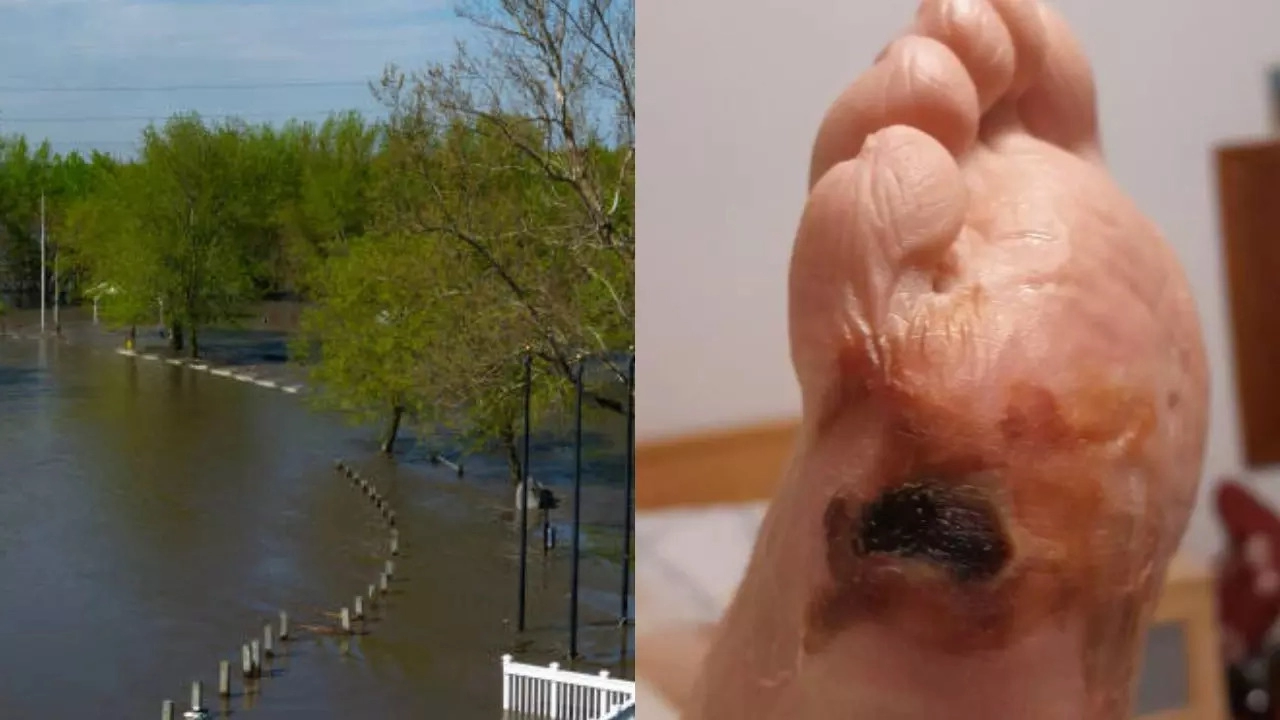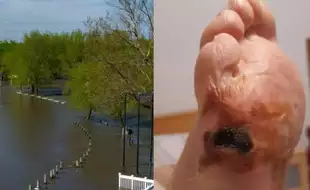
Flesh-Eating Bacteria Risk Soars In Florida Following Hurricane Milton—Are You At Risk? (Image Credits: iStock)
The Florida Department of Health has issued a public warning urging residents to avoid contact with floodwaters in the wake of Hurricane Milton due to the risk of exposure to Vibrio vulnificus, a flesh-eating bacteria that can cause severe, life-threatening infections. This bacterium is typically found in warm coastal waters, and its concentration tends to increase following heavy rainfall and flooding, especially in brackish (salty) waters.
Vibrio vulnificus can infect people when open wounds are exposed to contaminated water. According to the Florida Department of Health, people who come into contact with floodwaters should take extra precautions, as storm surges and flooding associated with hurricanes create ideal conditions for this bacteria to thrive.
Craig Baker-Austin, PhD, a senior research scientist at the Centre for Environment, Fisheries, and Aquaculture Sciences in the United Kingdom, noted that exposure to floodwaters is a common cause of increased Vibrio infections following hurricanes. "There is a significant rise in people exposed to floodwaters after such events," he explained. This pattern has been observed after several major hurricanes, including Hurricane Katrina in 2005 and Hurricane Ian in 2022. Dr Baker-Austin added that Hurricane Milton is likely to result in similar spikes in Vibrio infections.
Although the risk increases after hurricanes, Vibrio infections, known as vibriosis, remain relatively rare. According to Scott Rivkees, MD, a professor of public health at Brown University and former state surgeon general in Florida, the number of annual cases in the state ranges from 20 to 40, despite millions of people swimming in Florida's waters each year. Nationally, the Centers for Disease Control and Prevention (CDC) report approximately 150 to 200 Vibrio infections annually, with about 20 per cent of cases resulting in death.
Who Is At Risk?
Certain people are at higher risk of developing serious Vibrio infections. Those with weakened immune systems, liver disease, or open wounds are more vulnerable to the bacteria. Exposure to floodwaters or brackish water can lead to infection, and the consequences can be dire if not treated promptly.
Symptoms Of Vibrio Infection
Symptoms of a Vibrio infection can include diarrhoea, vomiting, abdominal pain, fever, chills, rapid heart rate, confusion, or disorientation. Anyone experiencing these symptoms after exposure to floodwaters should seek immediate medical attention.
To reduce the risk of contracting vibriosis, the Florida Department of Health advises residents to take the following precautions:
- Avoid swimming or wading in floodwaters, standing water, seawater, or brackish water if possible.
- Cover any open cuts or wounds with waterproof bandages if contact with these waters is unavoidable.
- Wash skin and wounds thoroughly with soap and clean water after any contact with potentially contaminated water.
Lisa Waidner, PhD, an assistant professor of biology at the University of West Florida, emphasized the importance of monitoring wounds for signs of infection within the first 24 hours after exposure to potentially contaminated waters. "It is crucial to seek immediate medical attention if any signs of infection appear," she stated. Dr Waidner also shows the importance of informing healthcare providers about potential exposure to seawater or floodwaters that may contain Vibrio bacteria.
Health experts along the Gulf Coast are typically well-versed in the risks associated with Vibrio vulnificus, but it is essential for individuals seeking treatment to mention their exposure to seawater and the possibility of contracting a bacterial infection like vibriosis. Early diagnosis and treatment are vital in preventing severe complications and saving lives.
As Florida continues to recover from the devastating impact of Hurricane Milton, residents are urged to remain vigilant and take necessary precautions to protect themselves from the dangers of flesh-eating bacteria present in contaminated floodwaters.
Get Latest News Live on Times Now along with Breaking News and Top Headlines from Health and around the world.

